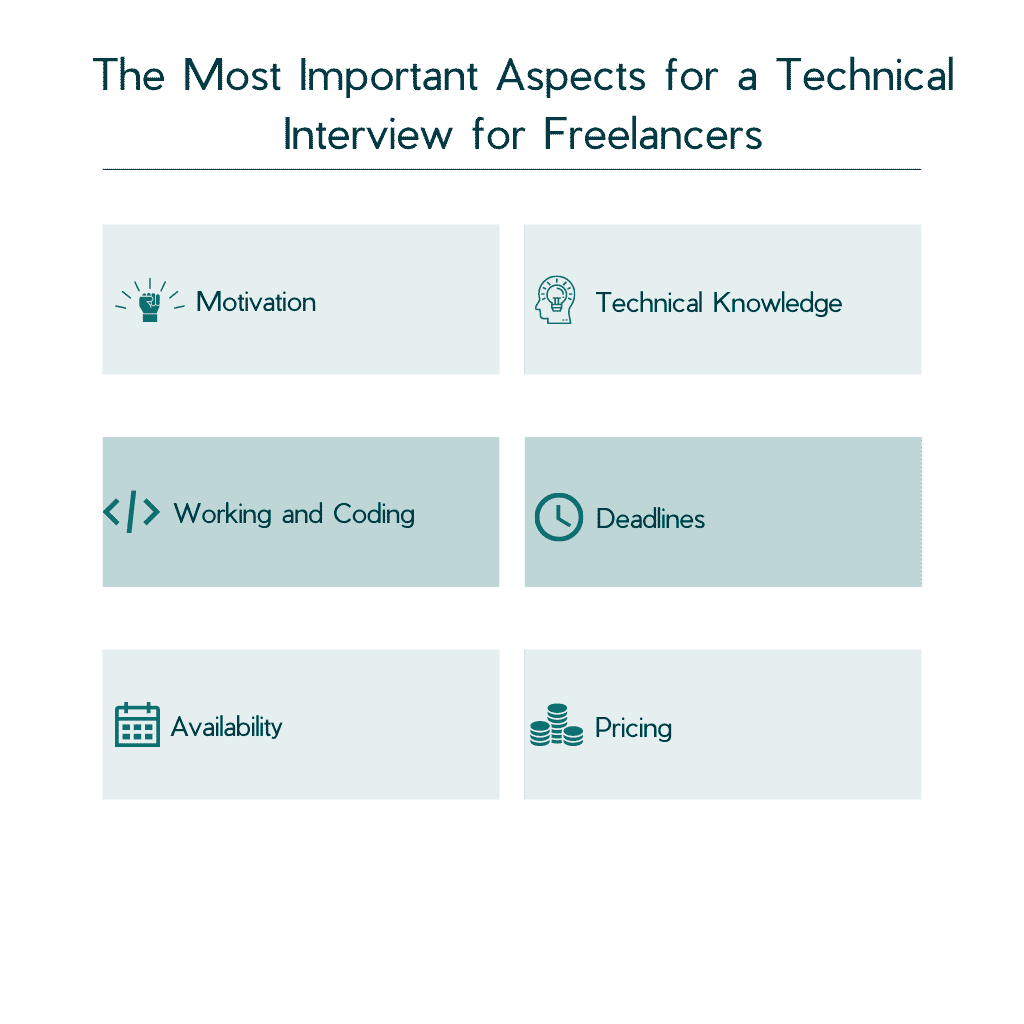Freelancers are a profitable addition to a team and can help foster innovation.
By conducting job interviews, companies can validate if a freelancer is a good fit for them or not and ensure they get the most from working with the candidate. On the other hand, freelancers who look for their next client need to know how to best prepare for a technical interview.
In this story, we share our insights on how to best prepare for a (technical) interview, from years of working with both freelancers and clients.
Technical Job Interviews - Basic Aspects
Generally, job interviews as a freelancer are not comparable to normal job interviews as a permanent employee. Companies are usually less interested in long-term aspects, but rather focus on results and experiences from previous projects.
A job interview as a freelancer can be thought of as a sales pitch. Instead of a product, however, you sell your services and skills. As with any product, the quality and the price-performance ratio should be appropriate. For this reason, it is important to be clear about your value and your skills and competencies.
The basic process of a technical job interview can be broken down into the following aspects:
- Each party, i.e., client, freelancer, and, if applicable, intermediary, briefly introduces themselves.
- The client introduces the project and the tasks involved.
- The freelancer introduces himself and his experience and presents approaches towards the project.
What Can I Do Before the Technical Interview?
Even before the interview, some mistakes can be eliminated and especially organizational mistakes can be avoided through good preparation. The following points will help you to prepare optimally for an interview:
Be Sure About Your Timing
Before you start thinking about a new project, you should make sure that it is manageable in terms of time. Compare the scope of the tasks with current projects and make sure that you could reasonably arrange and complete them.
Often companies are interested in whether you have several projects running in parallel. It is best, to be honest about your project situation to leave a serious impression.
If you have already drawn up a rough plan, you can also reliably explain to the interview partner that the task is manageable in terms of time.
Get To Know the Company
It is best to get to know the company before the first meeting and research important facts. On the one hand, this allows you to check whether the company matches your expectations, and on the other hand, it prepares you for possible questions about the company’s background.
The main focus is on the concept and the position in the market.
Prepare Your Portfolio and References
It is best to prepare previous project partners, references, or work that you have completed. This will give potential project partners an idea of your skills.
Also, prepare programming languages that you feel comfortable with. You should also know technical terms and current topics to appear professional.
Practice Programming
One’s skills can be improved through constant practice. You can simplify and improve code structures. Make sure that your coding is structured sensibly and simply. Connections should be visible and immediately understandable for any expert. There are a variety of platforms available, like Leetcode or HackerRank where you can practice your coding skills.

What Do I Need to Consider During the Technical Interview?
If you have prepared well for the interview, you have already created a good basis for a successful interview. You are aware of your skills, know the company, have your time management under control, and have prepared all the important documents.
With this background, you can start the interview confidently and even the first meeting will leave a positive impression.
But there are also some aspects to consider during the interview:
Motivation
Cooperation should work from both sides. Explain to your counterpart not only why you are the right choice, but also why you want to work with the company. In this way, your interviewer will recognize that you are also motivated to work together.
Make Your Technical Knowledge Clear
Companies are usually most interested in your skills, experience, and competencies, as they can best assess whether you have the right knowledge to successfully handle a task. Shorter, your skills must match the task at hand. It is best to show what you know about the topic and what experience you bring to the table using past work experiences.
Ideally, you should be able to apply your knowledge from previous projects to the task at hand and suggest initial solutions.
Also, concentrate on the programming languages you know best.
In addition, it is best to deal with topics such as clean code, code quality, testing, and mocking. Best practices, lessons learned, and possible future trends in these areas are also important.
A post for the top topics for freelancers in 2022 can be found here.
Be Able to Explain Working Procedures and Codes
Normally, companies are less interested in how exactly you work, as long as there is a finished and functioning project at the end. However, the explanation of the working methods helps to gain an impression of how you deal with problems.
A sensible way of dealing with criticism also plays an important role.
Your counterpart wants to see that you are professional, can solve problems, and can take criticism.
In terms of coding, you should be able to explain your preferred code architecture and your approach to coding. You can best explain your code sets when you understand them yourself. Also, be prepared to consider alternative options or other programming structures. Most important, however, is functional programming.
Dealing With (Missed) Deadlines
It is quite likely that you will not be able to meet deadlines from time to time. You should also be honest about this when your counterpart asks how you have dealt with missed deadlines in the past. It’s not that you have to be perfect, but how you approach and prioritize tasks when you can’t or couldn’t get them done on time. It is a sign of seriousness if you openly communicate that you have had problems with deadlines on rare occasions. The important thing is how you handle such situations.
Communicate Your Availability
A great advantage of being a freelancer is that you can set your working hours. However, it is best to make sure that you are also available, at least partially, during normal working hours. A useful option is to set a time frame in which you respond to emails and messages. This way, your project partner can see that good and easy communication is guaranteed and when he can expect answers on certain topics. Being available in case of emergency also leaves a good impression.
Keep the Asking Price Realistic
You should be able to estimate your value based on your skills and previous projects. However, be flexible when it comes to negotiating the hourly rate. On the one hand, not every project is the same and at the beginning of an interview, you do not know yet the expectations of your counterpart. On the other hand, you should not sell yourself short and negotiate a realistic hourly rate.
In this article, you can read how you can negotiate your hourly rate as a freelancer.
Conclusion
It can be stated that professional competencies, technical approaches, and exposure to topic-relevant areas play a key role in technical interviews for freelancers.
However, more fundamental aspects are also crucial. These include good preparation, authenticity, and a realistic self-assessment.
It is therefore important that you convince your interviewer of your programming skills and your abilities and, above all, that you give a serious and professional impression.
We at ElevateX will also help you to find exciting projects and serve as your contact person for IT freelancing.








